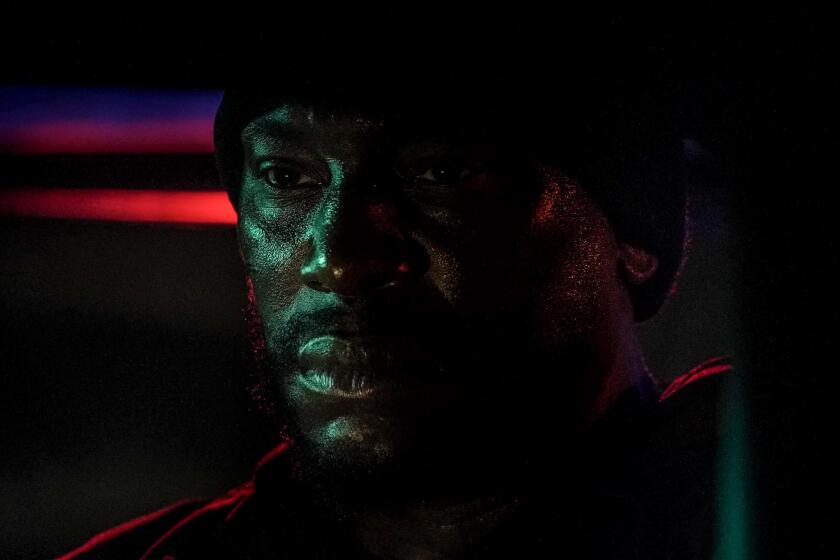‘Fantastic Four:’ How modern studios want us both to forget and remember
In August, Fox will release “Fantastic Four” with Miles Teller, Kate Mara and a host of other young stars in the superheroic group. That development is, depending on your world view, cause for great excitement or cause for a great yawn.
What the studio doesn’t want it to be is cause for great nostalgia.
On Tuesday, a report surfaced that Fox has pulled the previous iterations of the movie -- the Chris Evans-Jessica Alba one, the one with the star of “The Shield” doing some clobberin’ -- from iTunes and Amazon. Apparently, says the Hollywood Reporter, executives don’t want viewers muddying up their pleasures of viewing this movie with memories of the previous ones.
Per a person cited in the piece: “The source says the older titles might cause confusion in the marketplace,” which is a problem since the new one is “seeking to establish a different tone than the previous releases.” (Apparently, they say, such digital removals have been attempted before; there’s no evidence it’s being done with “Jurassic Park” in advance of this weekend’s release of “Jurassic World,” but it wouldn’t be surprising if it happened there too, given the film’s new cast and characters.)
The audience confusion would be understandable. It has only been eight years since a “Fantastic Four” movie came out with a different set of actors.
But the Fox digital move also highlights a flaw -- indeed one of the big flaws -- in Hollywood reboot thinking.
The rationale for reboots, at bottom, has been that because we already know these properties, a lot of the selling work has already been done. Essentially it’s a marketing head start provided by memory. But memory can work against us, or them, too. If we remember the earlier versions, we can also remember that we liked them and thus don’t like this as much (after we see the movie), or remember that we didn’t like them and not come out and see the movie in the first place. (Given how most people felt about the earlier “Fantastic Four” movies, that latter option is more likely, but either way.)
Hollywood these days is all about erasing what it just put out in favor of something newer, better and shinier. But the digital world and its reflexive need for archiving is about making sure nothing is ever forgotten or unavailable. And those two come into conflict.
In fact, this can all veer into the paradoxical when you realize that it’s an on-demand digital culture that drives studios to greenlight many of these movies in the first place. After all, if no one remembers that the “Fantastic Four” movies ever came out -- a memory aided very much by our ability to watch them whenever we want, wherever we want -- it would be a lot less likely Fox would want to make a new one to begin with.
What studios hope for, then, is a kind of selective memory. “Remember the feeling you had that made you want to come out and see the previous movie? Good. Just don’t remember any specifics that might interfere with your enjoyment or understanding of the new one.”
Whether they can wipe the digital record clean is one thing. (It’s not as easy as it sounds -- the movies will still be available on DVD or subscription services such as Netflix, among others.) Whether they can actually wipe our memories is another. Some, in fact, might look at what studios are doing here and say the reboot craze has reached its inevitable terminus. You can’t keep asking people to forget what just happened and get away with it. Or at least, you can’t keep asking people to forget what just happened and still have them care about what’s going to happen.
That doesn’t mean that studios won’t keep trying, at least in the near term. Over the next two years, we’ll see several comic book movies that will start afresh on characters we’ve only just watched, with other actors and in other guises, in the previous decade -- “Superman,” Batman” and “Spider-man,” to name three. (Notably, in all three cases, the movies they want us to semi-forget were themselves reboots, coming on the heels of previous iterations. The reboots have become re-reboots.)
Given Fox’s recent move, the studios’ pitch will be clear. Come see the new movie, which you should see because it evokes thoughts of the old movie. Just don’t think about the old one so hard that you don’t want to see this one.
Twitter: @ZeitchikLAT
More to Read
Only good movies
Get the Indie Focus newsletter, Mark Olsen's weekly guide to the world of cinema.
You may occasionally receive promotional content from the Los Angeles Times.











